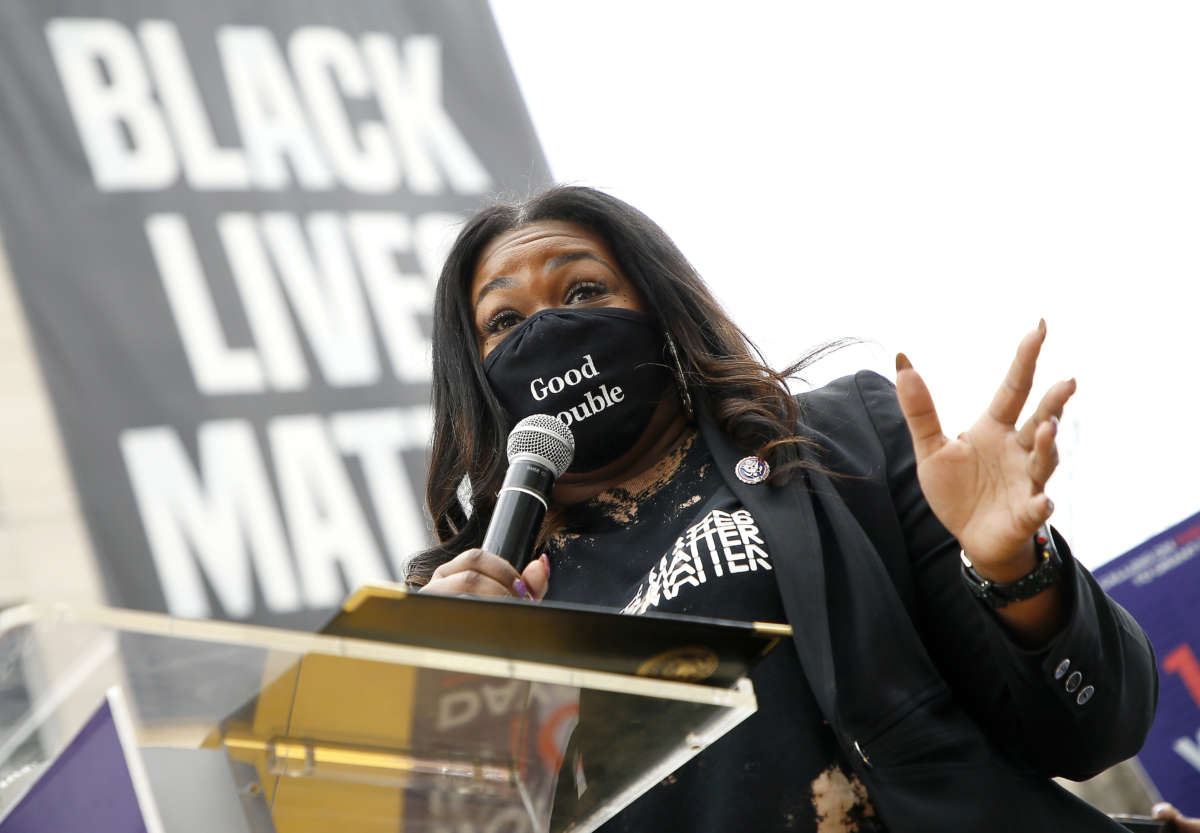Rep. Cori Bush (D-Missouri) has introduced a bill that aims to transform public safety in the U.S. by transitioning away from policing and toward responses that aren’t focused on violence, incarceration and criminalization.
The People’s Response Act would create a public safety division within the Department of Health and Human Services (HHS) in order to help guide research and run grant programs for “health-centered investments” in public safety, according to a press release on the bill. It would launch a federal first responders unit and provide funding to support state and local governments in transitioning away from punitive emergency responses.
“The People’s Response Act will transform public safety into a system of care rather than criminalization, healing rather than incarceration, and prevention rather than policing,” said Bush in a statement. “We are safer when our communities are well funded, our people are healthy and housed, and our children have nutritious meals, excellent schools, and green spaces to play in.”
The proposal, if passed, could mark the first major federal step towards police abolition, which Bush has advocated for. As abolitionist Mariame Kaba argues in her recent book, We Do This ‘Til We Free Us, funding kinder approaches to emergencies like social programs and experts instead of the police is a crucial step toward the ultimate goal of police and prison abolition.
Though Bush’s bill, supported by Representatives Ayanna Pressley (D-Massachusetts), Jan Schakowsky (D-Illinois) and Congressional Progressive Caucus leader Pramila Jayapal (D-Washington), doesn’t call for defunding police departments, it could create a more holistic approach to public safety. The lawmakers propose creating a $2.5 billion grant to fund the hiring of thousands of first responders who specialize in mental health, social work and substance use, among other specialities, to provide an emergency response system aimed at helping — not punishing — people in crisis.
As Bush points out, emergency calls are often more dangerous than helpful for the public, especially for Black and Brown communities. “When people in crisis need help, calling 911 too often becomes a death sentence,” she said on Twitter.
In a video advocating for the bill, Bush points to the case of Atatiana Jefferson, who was murdered by a police officer during what was supposed to be a standard welfare check. Jefferson, a Black woman, was in her home studying when former Fort Worth police officer Aaron Dean shot her through a window.
The bill comes at a time when activists have drawn attention to many cases like Jefferson’s, where a Black person has been killed by police often seemingly just for existing. Protests for the movement for Black lives that swept the country over the past year often called for police abolition, arguing that an institution focused on perpetuating criminalization and violence shouldn’t exist.
Politicians on both sides of the aisle often say, in response to growing calls for abolition and in response to a growing overdose crisis, that police need more funding to combat these issues. But policing often does little to help communities and people in crisis, and abolitionists argue that police belong to an institution that can’t be reformed.
“For too long, our flawed approach to public safety has centered criminalization, surveillance and incarceration, rather than care, justice and healing,” said Pressley in a statement. “Our bill would help change that by directing the federal government to take a health-centered approach to public safety and investing in trauma-informed, community-based responses that will truly keep people safe.”
Though the bill could represent a step toward abolition, it also gives power to HHS, a government agency that abolitionists have been skeptical of funding. Under Donald Trump, HHS institutionalized anti-LGBTQ oppression and helped to sabotage the U.S.’s COVID response.
Still, though it faces long odds of passing, the People’s Response Act could represent a crucial shift toward a public safety approach focused on healing — and away from the corrupt system of policing.
Press freedom is under attack
As Trump cracks down on political speech, independent media is increasingly necessary.
Truthout produces reporting you won’t see in the mainstream: journalism from the frontlines of global conflict, interviews with grassroots movement leaders, high-quality legal analysis and more.
Our work is possible thanks to reader support. Help Truthout catalyze change and social justice — make a tax-deductible monthly or one-time donation today.
